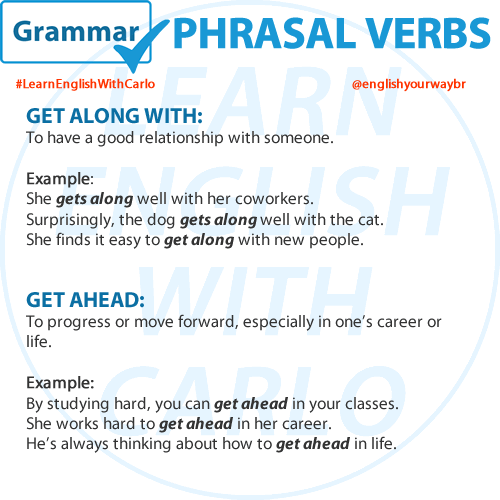Phrasal verbs with “get” are versatile and widely used in English. They combine with prepositions or adverbs to convey various meanings, making them essential for both casual and formal communication. Here’s a closer look at some common phrasal verbs with “get,” their meanings, and examples to help you understand them better.

GET UP
Meaning: To arise from bed; to get out of bed.
Examples:
- I usually get up at 7 a.m. during the week.
- On weekends, I prefer to get up late and relax.
This phrasal verb is frequently used when talking about starting your day.
GET ALONG
Meaning: To have a harmonious relationship; to interact well with others.
Examples:
- Despite their differences, they manage to get along.
- My brother and I didn’t get along when we were kids, but now we’re very close.
This is a great way to describe relationships, especially when harmony is involved.

GET OVER
Meaning: To recover from an illness, setback, or emotional distress.
Examples:
- It took him a long time to get over the loss of his pet.
- She’s finally getting over the flu and feels much better now.
Use this when referring to emotional or physical recovery.
GET IN
Meaning: To enter or arrive at a place.
Examples:
- We got in just before the rain started.
- What time did you get in last night?
“Get in” is commonly used for arrival, often with a sense of timing.

GET OFF
Meaning: To disembark from a vehicle or leave a place.
Examples:
- I’ll get off the bus at the next stop.
- We need to get off at the first train station.
This is often used when referring to public transportation or leaving a location.
GET OUT
Meaning: To leave a place; to escape.
Examples:
- Let’s get out of here before it gets too crowded.
- She told them to get out of the room immediately.
This phrasal verb is useful when talking about leaving quickly or escaping.

GET BY
Meaning: To manage to survive or cope with a situation, especially with difficulty.
Examples:
- We can get by with what we have for now.
- He’s not earning much, but he manages to get by.
“Get by” often refers to managing with limited resources.
GET THROUGH
Meaning: To successfully complete or endure something, especially something difficult.
Examples:
- We finally got through all the paperwork.
- She got through the exam even though it was very challenging.
This is a go-to phrase for describing persistence and overcoming difficulties.

GET ALONG WITH
Meaning: To have a good relationship with someone.
Examples:
- She gets along well with her coworkers.
- He doesn’t get along with his neighbors because of frequent disputes.
Adding “with” specifies the person or group involved in the relationship.
GET AHEAD
Meaning: To progress or move forward, especially in one’s career or life.
Examples:
- She works hard to get ahead in her studies.
- He took extra courses to get ahead in his career.
This phrasal verb is useful when discussing progress and achievement.

Tips for Learning Phrasal Verbs with “GET”
- Context is key: Learn these verbs by practicing them in meaningful sentences.
- Use them regularly: Incorporate phrasal verbs into your conversations and writing.
- Observe native usage: Watch movies or listen to podcasts to see how native speakers use these expressions naturally.
- Practice and repeat: The more you use them, the more comfortable you’ll become.
Phrasal verbs with “get” are a cornerstone of conversational English. Practice these examples, and you’ll soon use them with ease in your daily communication!
